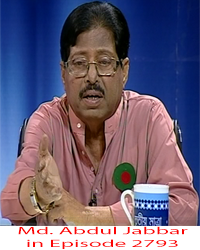Abdul Jabbar

| Singer of Swadhin Bangla Betar Kendra |
| Singer |
Full Name: Mohammed Abdul Jabbar
Affiliation: Bangladesh Betar and Bangladesh Television
Current Position: Deceased
Date of Birth: February 10, 1936
Date of Death: August 30, 2016
Place of Birth: Bangladesh
Home District: Kushtia
Nationality: Bangladeshi
Profile:
Mohammed Abdul Jabbar (10 February 1936 – 30 August 2016) was a Bangladeshi singer, who reached the pinnacle of fame when he sang 'Salam Salam Hazar Salam', 'Ore Neel Dariya' and 'Joy Bangla Bangla Joy' which was aired on Swadhin Bangla Betar Kendra during the war of independence of Bangladesh. He was also awarded the two highest civilian awards, the Ekushey Padak (1970) and the Swadhinata Puraskar (1996), given by the Bangladesh Government.
Jabbar was born in Kushtia, spurred on by his mother, he plunged headlong into the world of music. In his teens, he played both football and cricket and entertained the spectators with his sonorous voice on the same ground after winning the match. Later, after passing his SSC examination in 1956, he formally learned music from Ustad Osman Gani and Ustad Lutfel Haque.
In 1958, Jabbar became an enlisted singer at Bangladesh Betar (Radio) and did the playback for Bangla films from 1962. In 1964 when Bangladesh Television (BTV) embarked on its journey, he was naturally signed up as his fame had grown by leaps and bounds in the meantime.
The very first song Jabbar sang and composed for Bangladesh Betar was "Hariye elam kothay bolo amar shey shathitirey", written by poet Azizur Rahman. Along with Ferdausi Rahman he playbacked in a duet "Tumi achho kachhey"for the film Notun Shur, directed by Ehtesham and composed by Robin Ghosh. In the film “Etotuku Aasha”, Jabbar playbacked for the popular song “Tumi ki dekhechho kobhu”, written and composed by Dr. Muniruzzaman and Satya Shaha respectively. That was his debut song aired on BTV.
Jabbar is credited as a playback singer of the '60s and '70s. Among them “O rey nil doriya” (Sareng Bou); “Khelaghar barey barey keno bhengey jaay” (Chhadmabeshi); “E prithibi amar proshno shono” (Nacher Putul); “Dukkho korona bandhu tomra” (Aalor Michhil); “Amon korey bolo na go tumi” (duet with Runa Laila in the film Iman) are highly popular.
Jabbar is a Freedom Fighter. He inspired the singers of Swadhin Bangla Betar Kendra (SBBK) to such an extent that ultimately depicted the Freedom Fighters as being symbolic of an epic struggle for liberty. In 1971, he met the legendary singer Hemanto Mukhopadhyay in Bombay and worked tirelessly to raise public opinion in favour of the Independence of Bangladesh. Later, Hemanto Mukhopadhyay along with Gauri Prashanna Majumdar, (the lyricist of "Shono ekti mujiborer thekey lokkho mujiborer kanthoswarer") came to Bangladesh on invitation of Bangabandhu.
Jabbar sang the first song of Swadhin Bangla Betar Kendra, "Joi Bangla Banglar Joi", written and composed by Gazi Mazharul Anwar and Anwar Parvez respectively. The other patriotic songs rendered and composed by Jabbar during the pre and post-Liberation period were "Salam salam hajar salam", written by Fazle Khoda, "Mujib baiya jao rey", written by Shafi Bangali and "Banglar swadhinata anlo ke mujib mujib", written by Nawazish Ali. There are many more renditions by Jabbar that will always be treasured by the nation.
Jabbar received many prestigious awards for his outstanding works: among them Bangabandhu Swarna Padok (1973), Ekushey Padok (1980), Swadhinata Padok (1996), Zahir Raihan Chalachchitra Purashkar, BACHSAS Award and Mother Teresa Award.
Register for comment









